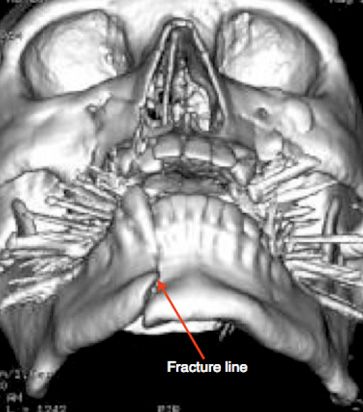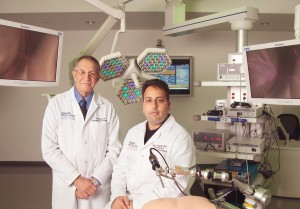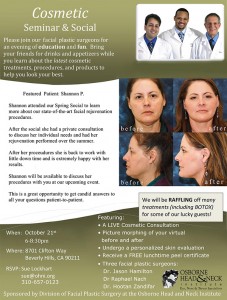- Folded Ear in Newborns: Treatment Options - April 11, 2018
- Newborn Ear Deformity: What Can Be Done? - April 11, 2018
- Ear Molding: An Overview - November 2, 2017
- Otoplasty for Protruding Ears - September 26, 2017
- Basal Cell Carcinoma: Facial Reconstruction Timing - September 26, 2017
- Clinical Considerations of Mohs Reconstruction of Cheek Defect - September 26, 2017
- Basal Cell Carcinoma: Nasal Bridge Reconstruction - September 26, 2017
- Skin Cancers Involving the Eyebrow: Clinical Considerations - October 3, 2016
- Treatment of Multiple Skin Cancer Lesions - June 1, 2016
- Skin Cancer: Nasal Reconstruction and Scar Management - June 1, 2016
Can wiring my jaw shut be avoided when repairing a mandibular fracture?
Question: I was recently assaulted on my way home from the gym. As a result of the incident, I suffered a jaw fracture. My jaw was initially extremely painful and continues to swell and hurt when I attempt to open my mouth. I was evaluated in the emergency room and was told that I had a mandibular fracture and that I would need to see a specialist to have my jaw wired. I have known people with similar injuries who have needed to have their jaws wired shut for weeks. Is there any way to avoid wiring my jaw?
Discussion:
Most cases of mandibular fracture can be treated without wiring the jaw shut. Treatment of mandibular fractures depends on the specific site of fracture and careful evaluation by a facial trauma specialist. Modern techniques allow a skilled surgeon, in most cases, to stabilize mandibular fractures by using thin plates that are not visible once in place. Small incisions are made inside of the mouth along the gum line through which the plates are attached permanently onto the mandible fragments. By joining the bones together the structure is stabilized, and the proper orientation is preserved during healing. This technique avoids visible scaring or damage to the delicate underlying structures of the face.
Alternatively in very limited circumstances where jaw wiring is indicated, a trauma specialist can employ a technique called early mobilization. This technique wires the jaw for a maximum of 10 days instead of 6-8 weeks seen in traditional procedures. After the initial 10 days have passed, special rubber bands are placed in the back of the mouth to preserve the orientation of the jaw and bite pattern. The rubber bands remain in place during healing and allow for greater stability and comfort. Typically, extended periods of jaw wiring can lead to damage to the joints of the jaw (temporomandibular joint or TMJ). Damage to the TMJ can potentially lead to complications such as jaw popping or even jaw dislocation. By utilizing cutting edge techniques, the discomfort, limitation, and complications of extended wiring can be avoided.

In all cases of suspected mandibular fracture, it is important to seek evaluation from a facial trauma specialist. During an evaluation a CT scan of your head is usually ordered. This scan allows the physician to determine the extent and location of any fractures that may have occurred. In addition the physician is also able to determine if any misalignment of the fragments has occurred. In some cases of misalignment patients may complain of an uneven bite or even be able to see that their teeth are not at the same level. Proper evaluation can also help to avoid damage to the TMJ.
Dr.’s Zandifar and Hamilton, of the Osborne Head and Neck Institute, Facial Plastic and Reconstructive Surgery Division perform mandibular fracture repairs regularly. Our physicians are double board certified in Otolaryngology and Plastic/Reconstructive Surgery, a unique combination held by only a limited number of doctors, worldwide. Their unique training and experience allows them to address the functional as well as aesthetic concerns involved in facial trauma.
Key Points:
- Most cases of mandibular fracture can be treated without wiring the jaw shut.
- Modern techniques allow a skilled surgeon to stabilize mandibular fractures by using non visible thin plates in place of wiring.
- In few cases where jaw wiring is unavoidable, a special technique called early mobilization is used, decreasing the wiring time from 6-8 weeks to 10 days.
- Avoiding or decreasing the time of jaw wiring prevents damage to the temporomandibular joint (TMJ) and its complications.
- Drs. Jason Hamilton and Hootan Zandifar of the Osborne Head and Neck Institute, Facial Plastic and Reconstructive Surgery Division are facial trauma specialists who perform mandibular fracture repairs regularly.
To learn more about Dr. Hootan Zandifar or mandibular fracture repair please visit www.facialtraumamd.com.



